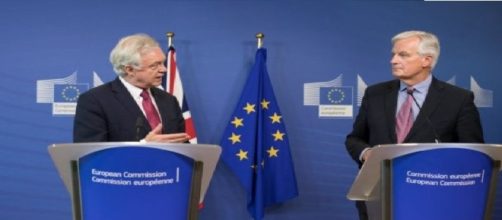Brexit Secretary David Davis has advised the European Union (EU) to begin trade negotiations at the same time as withdrawal discussions.
Since the Prime Minister triggered Article 50, the mechanism for a country to leave the EU under the 2007 Lisbon Treaty, the European Commission said they want talks to commence in two stages: the UK's departure followed by trade discussions.
Northern Ireland has made parallel talks necessary
But the Brexit Secretary is piling pressure on Brussels to reconsider their timetable, saying the two topics must be discussed in parallel with each other.
He wrote an article in the Sunday Times saying that the issue of Northern Ireland has made parallel talks necessary. Mr. Davis also warned that there can be no agreement on the Irish border until future customs arrangements have been agreed between the two sides.
The trading bloc's chief negotiator, Michel Barnier, has repeatedly said that an agreement must be reached on Britain's financial obligations, the rights of EU citizens residing in the UK and the Irish border, prior to discussions on customs and trade arrangements.
Mr. Barnier has also said trade discussions are unlikely to begin in October because there has been no sufficient progress on these three outstanding issues. UK ministers insisted they would still like trade talks to go ahead even if no agreement has been made on the size of Britain's proposed divorce bill.
The European Council, which consists of the leaders of the EU's 28 member states, has the power to decide when to begin talks about a trade agreement. They will be meeting at the end of October to discuss Brexit. Brussels' chief negotiator is likely to request permission to enhance the negotiations so that they can include free trade.
It is in neither side's best interest to repeat specific aspects of the negotiations
However, the Brexit Secretary attacked the European Commission's stubborn attitude to the negotiating timetable, which he said is stalling progress on Northern Ireland and the divorce bill. He said it is neither side's best interest to repeat specific aspects of the negotiations as time runs out.
Mr. Davis urged both sides to demonstrate some adaptability.
A senior Whitehall source said the EU is creating its own mess in the discussions whilst the British Government prepares to leave the trading bloc with an adequate agreement on trade. They added it would be better to discuss trade as soon as possible, especially with Ireland delaying talks.
A global Britain that can trade with the rest of the world
The Department for Exiting the EU is publishing five new papers which consist of two formal position papers on the continuity in the availability of goods and protection of documents. They will also reiterate Britain's desire to stop the jurisdiction of the European Court of Justice and discuss how laws can be enforced in the future.
There will also be papers on dispute resolution and data protection. The Brexit Secretary will bring these five papers to his meeting with Mr. Barnier in October.
The paper on services is viewed as significant because the UK Government will be demanding services associated with goods, such as maintenance and repairs, to be included in withdrawal discussions. It aims to provide certainty for businesses and consumers and prevent a cliff-edge for them.
Mr. Davis said he is ready to sit down and discuss with the European Commission how both sides will collaborate with each other in the future. He added that when he meets Mr. Barnier at the end of this month, this is what he will be discussing with him whilst the British Government strives to form a global Britain that can trade with the rest of the world.
Last week, International Trade Secretary Dr. Liam Fox travelled to Panama and Colombia to discuss new trade deals with them ready for when the UK quits the trading bloc. Dr. Fox announced that support available from UK Export Finance with the two nations is doubling, up to £3.5 billion for Panama and £4.5 billion for Colombia.

